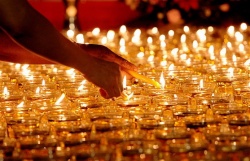Difference between revisions of "Vesākha"
| Line 1: | Line 1: | ||
[[File:Candles 1.jpg|thumb|250px|]] | [[File:Candles 1.jpg|thumb|250px|]] | ||
| − | Vesākha is the second month of the Buddhist calendar, Vesak being the Sinhalese pronunciation.According to Theravāda tradition, Siddhattha Gotama was born, became enlightened and passed away on the full moon eve of the month of Vesākha, although this is not mentioned anywhere in the Tipiṭaka. According to the scriptures, while the Buddha was staying at Vesāli he said that he would pass away in three months time (ito tiṇṇaṃ māsānaṃ, D.II,114). As he did not leave Vesāli until the end of the rainy season (mid-October), he would have passed away no later than mid-January. | + | [[Vesākha]] is the second month of the [[Buddhist]] calendar, [[Vesak]] [[being]] the Sinhalese pronunciation.According to [[Theravāda]] [[tradition]], [[Siddhattha]] [[Gotama]] was born, became [[enlightened]] and passed away on the [[full moon]] eve of the month of [[Vesākha]], although this is not mentioned anywhere in the [[Tipiṭaka]]. According to the [[scriptures]], while the [[Buddha]] was staying at [[Vesāli]] he said that he would pass away in three months [[time]] (ito tiṇṇaṃ māsānaṃ, D.II,114). As he did not leave [[Vesāli]] until the end of the rainy season (mid-October), he would have passed away no later than mid-January. |
| − | When the Chinese monk Hiuen Tsiang was in India during the 7th century, he found that while most Buddhists celebrated the Buddha’s birth, enlightenment and passing on Vesākha, some sects did so at other times. He wrote: ‘According to the general tradition, the Tathāgata was 80 when, on the 15th day of the second half of the month of Vesākha, he attained final Nirvāṇa .... But the Sarvāstivādins say he died on the 8th day of the second half of the month of Kattika .... The Bodhisattva was born on the 8th day of the second half of the month of Vesākha .... But the Sāvaka school say that it was the 15th day of the second half of Vesākha.’ | + | When the {{Wiki|Chinese}} [[monk]] Hiuen Tsiang was in [[India]] during the 7th century, he found that while most [[Buddhists]] celebrated the [[Buddha’s]] [[birth]], [[enlightenment]] and passing on [[Vesākha]], some sects did so at other times. He wrote: ‘According to the general [[tradition]], the [[Tathāgata]] was 80 when, on the 15th day of the second half of the month of [[Vesākha]], he attained final [[Nirvāṇa]] .... But the [[Sarvāstivādins]] say he [[died]] on the 8th day of the second half of the month of [[Kattika]] .... The [[Bodhisattva]] was born on the 8th day of the second half of the month of [[Vesākha]] .... But the [[Sāvaka]] school say that it was the 15th day of the second half of [[Vesākha]].’ |
| − | In Theravādin Buddhist countries, Vesākha is a public holiday and on that day people flock to temples to hear sermons, practise meditation and honour the Buddha with various ceremonies. See Kusinārā and Travels. | + | In [[Theravādin]] [[Buddhist]] countries, [[Vesākha]] is a public holiday and on that day [[people]] flock to [[temples]] to hear sermons, practise [[meditation]] and honour the [[Buddha]] with various ceremonies. See [[Kusinārā]] and Travels. |
| − | The Significance of Vesak, K.N. Jayatilleke, 1972. | + | The Significance of [[Vesak]], K.N. Jayatilleke, 1972. |
{{R}} | {{R}} | ||
[http://www.buddhisma2z.com/content.php?id=443 www.buddhisma2z.com] | [http://www.buddhisma2z.com/content.php?id=443 www.buddhisma2z.com] | ||
[[Category:Vesak]] | [[Category:Vesak]] | ||
[[Category:Buddha Shakyamuni]] | [[Category:Buddha Shakyamuni]] | ||
Revision as of 01:49, 4 September 2013
Vesākha is the second month of the Buddhist calendar, Vesak being the Sinhalese pronunciation.According to Theravāda tradition, Siddhattha Gotama was born, became enlightened and passed away on the full moon eve of the month of Vesākha, although this is not mentioned anywhere in the Tipiṭaka. According to the scriptures, while the Buddha was staying at Vesāli he said that he would pass away in three months time (ito tiṇṇaṃ māsānaṃ, D.II,114). As he did not leave Vesāli until the end of the rainy season (mid-October), he would have passed away no later than mid-January.
When the Chinese monk Hiuen Tsiang was in India during the 7th century, he found that while most Buddhists celebrated the Buddha’s birth, enlightenment and passing on Vesākha, some sects did so at other times. He wrote: ‘According to the general tradition, the Tathāgata was 80 when, on the 15th day of the second half of the month of Vesākha, he attained final Nirvāṇa .... But the Sarvāstivādins say he died on the 8th day of the second half of the month of Kattika .... The Bodhisattva was born on the 8th day of the second half of the month of Vesākha .... But the Sāvaka school say that it was the 15th day of the second half of Vesākha.’
In Theravādin Buddhist countries, Vesākha is a public holiday and on that day people flock to temples to hear sermons, practise meditation and honour the Buddha with various ceremonies. See Kusinārā and Travels.
The Significance of Vesak, K.N. Jayatilleke, 1972.
